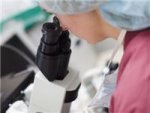
Childless women in their early thirties should consider freezing their
eggs as an “insurance policy” against future fertility problems, experts today
suggested.
American scientists said egg freezing would be “cost effective” for the
average woman who delays motherhood until her mid to late thirties and beyond. And
it would give older women a “better chance” of conceiving than trying to become
pregnant naturally at 40.
Dr Kate Devine, clinical fellow at the US National Institute of Health,
said egg freezing was never a cast-iron guarantee of conception but added: “I
would recommend it if you’re in your early thirties, there’s no one on the
horizon and you don’t think there’s any chance of having children in the next
four or five years.v“I see a lot of people doing it in their early thirties,
and that’s probably the optimum age. If you don’t have a partner you might want
to preserve your fertility in time and wait to find Mr Right. If you’re in a
high-stress career, working hard, I think that’s a reasonable time to start to
do it.” She said: “Obviously some women will never need to use their eggs. This
is just an insurance policy of sorts.”
Although the technique is widely available it can cost as much as
£5,000. Yet experts said it had improved so much, and that IVF remains so
expensive, that egg freezing is a reasonable option for those wishing to have
children later in life. There is a 70 per cent chance of a baby if women freeze
their eggs in their early thirties, dropping to 50 per cent at the age of 38. This
compares to the 36 per cent success rate of conceiving via IVF at age 41. "Up
to the age of 38 the most cost-effective strategy is to freeze your eggs at
that age," Dr Devine concluded.
Dagan Wells, a fellow in obstetrics and gynaecology at the University of
Oxford, said the recommendation made sense: "If you do try to start a
family in your late 30s it’s probably going to be one or two years before you
realise that’s a problem and by that point your chances of successful IVF are
really low. If people plan ahead ... then they will have some degree of
fertility preservation."
In the UK, the cost of removing and freezing a woman’s eggs can be up to
£5,000 plus an annual fee of £200 for each year that they are stored. Despite
this, the US experts said several rounds of IVF at the age of 40 could cost
double this amount. Yet the process of “banking” eggs requires women to take
high doses of hormones to stimulate their ovaries. It is a relatively new
procedure in Britain and it is estimated that less than ten babies have been
born from frozen eggs since the first in 2002. It is usually reserved for use
by women undergoing cancer treatment, which can damage fertility.
But a recent survey by Red magazine showed one fifth of 28 to
45-year-old women had considered freezing their eggs for later use. However
Josephine Quintavalle, of the group Comment on Reproductive Ethics, warned that
egg freezing can occasionally cause fatal blood clots: “Egg harvesting is a
very uncomfortable invasive process, and can actually go seriously wrong. "Keep
searching is my advice and spend the money on finding Mr Right rather than
enriching the IVF providers."
Yahoo Lifestyle
Please
search
With egg freezing (oocyte cryopreservation) as a young woman you can achieve reproductive freedom by storing your healthy unfertilized eggs (oocytes) until a time in the future when you are ready to begin your family.
ReplyDeleteEgg Freezing Cost
Egg freezing is a great way to "preserve" your fertility without feeling the pressures of the “biologic clock”.
ReplyDeleteEgg Freezing Cost
Very interesting article about women choosing to freeze their eggs so that they can choose to conceive later and reduce the risk of birth defects.
ReplyDeleteEgg Freezing Cost(s)